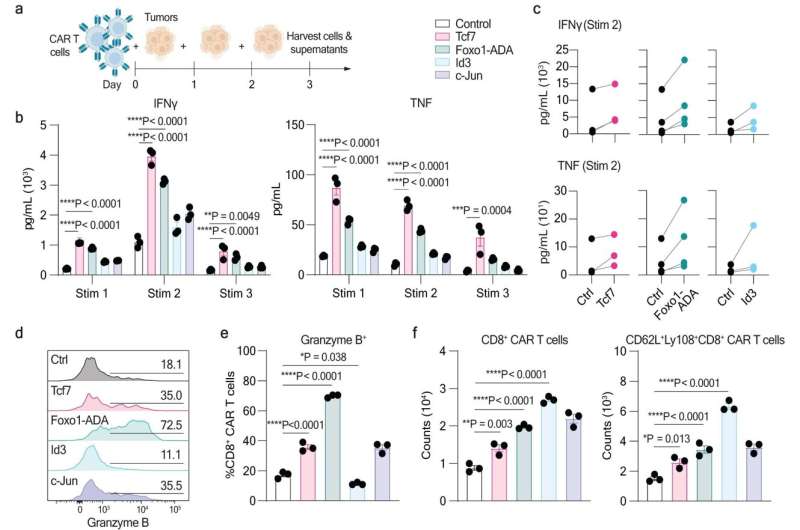This article has been reviewed according to Science X's editorial process and policies. Editors have highlighted the following attributes while ensuring the content's credibility:
fact-checked
peer-reviewed publication
trusted source
proofread
Researchers stimulate gene that enhances CAR T-cell treatments for solid tumors

Researchers at Peter Mac have overcome a major barrier that could see a revolutionary immunotherapy treatment becoming successful on patients with solid cancer types.
Published
in Nature, Professor Phil Darcy, Associate Professor Paul Beavis and Dr. Junyun Lai's work focuses on finding a way for Chimeric Antigen Receptor (CAR) T-cell therapy to successfully treat solid tumors, which account for 90% of all cancers. CAR T-cell therapy is a type of cancer treatment that genetically modifies your own immune T-cells to recognize and fight cancer. This treatment has been successful in some blood cancers but is less effective in solid cancers for several reasons, including poor cell persistence and functionality in a hostile tumor environment. The latest research, using ovarian, breast and colon cancer models, has identified a gene that can be stimulated to make the cells younger, fitter, more dynamic and effective in fighting solid tumors. "Our research identified a gene called FOXO1 that can be stimulated to enhance CAR T-cell polyfunctionality, metabolic fitness and efficacy against solid tumors," Professor Darcy said. "Essentially, it means the new T-cells can use multiple techniques to kill and destroy the
"Cancer cells are very effective at launching new attacks on T-cells to ensure their survival, but our research has shown these cells with increased FOXO1 protein expression are able to fight off the cancer better."
Cancer cells often find ways to evade the immune system. When this happens, the immune system needs to be "re-trained" to recognize and attack cancer cells. This new research presents a unique approach to CAR T-cell therapy with promising results.
"No other study has looked at using factors to enhance the metabolic fitness of CAR T-cells," Associate Professor Beavis said. "We're excited by these results and believe it's a promising strategy for the treatment of solid cancers."
More information: Jack D. Chan et al, FOXO1 enhances CAR T cell stemness, metabolic fitness and efficacy, Nature (2024). DOI: 10.1038/s41586-024-07242-1



















